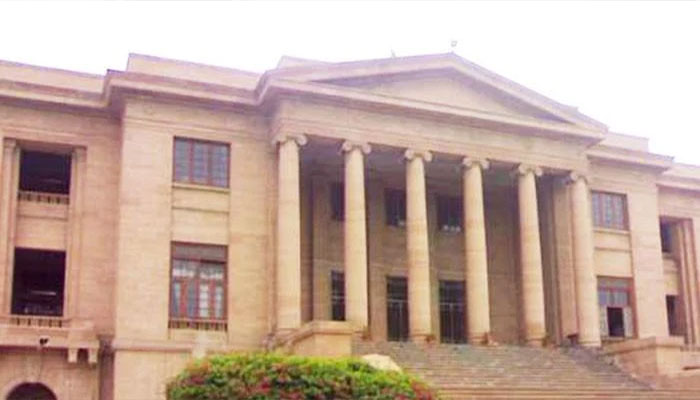PTM MNA’s bail plea in hate speech case rejected
KARACHI: The Sindh High Court on Tuesday dismissed the bail application of Pashtun Tahaffuz Movement (PTM) leader MNA Ali Wazir in a case pertaining to the alleged use of provocative language against state institutions.
The lawmaker had been arrested in December last year for allegedly using defamatory and provocative language against state institutions during a rally in Karachi’s Sohrab Goth.
The applicant’s counsel said Wazir was falsely implicated in the case due to political motives, and no case of terrorism was made out against him. The counsel said the content of Wazir’s speech does not reveal any offence being committed by him and the ingredients of the sections under which he is charged have not been made out, as the translation of the speech is dubious and inaccurate.
After hearing the arguments, an SHC division bench comprising Chief Justice Ahmed Ali M Sheikh and Justice Omer Sial said it was not denied that a public gathering was held on December 6, 2020 in which the applicant delivered a speech.
The court said that on a tentative assessment of the speech that was on record, it was found that the applicant used uncouth, vulgar, obscene and uncivilised language against state institutions, apart from language and words that might have the potential of creating disharmony and inciting provincial differences.
The bench said it is incumbent upon all persons and institutions of Pakistan to ensure the stability and security of the country and not to incite feelings that have the potential to lead to the contrary.
The court said healthy and constructive criticism against any person or institution expressed in a civilised manner should be permissible, but a distinction must be drawn between criticism and spewing venom through uncouth language.
The bench said the applicant cannot be permitted to say things on the basis of freedom of expression when its effect can be to destabilise the country. The court said the applicant’s statement recorded under Section 161 reflects that he owns up to the speech he made and stands by the claim that he has done nothing wrong.
The bench said if he had said what he is alleged to have said and if his words amount to an offence under the penal code, that is for the trial court to determine after evidence is recorded.
The court said the veracity of the arguments of the applicant’s counsel that the translation made by the police officer was the same as that made by the University of Peshawar was also an issue that required deeper appreciation of evidence that could not be embarked upon by the court in the application.
The bench said the applicant indeed has a case to answer and, therefore, the bail application is dismissed. The court directed the trial court to endeavour to conclude the trial within six months and submit a compliance report through the member inspection team.
The trial court had earlier denied bail to the lawmaker, observing that the content of his speech prima facie connected him to incitement of hatred and attempts to cause disaffection towards state institutions.
-
 Winter Olympics 2026: Lindsey Vonn’s Olympic Comeback Ends In Devastating Downhill Crash
Winter Olympics 2026: Lindsey Vonn’s Olympic Comeback Ends In Devastating Downhill Crash -
 Adrien Brody Opens Up About His Football Fandom Amid '2026 Super Bowl'
Adrien Brody Opens Up About His Football Fandom Amid '2026 Super Bowl' -
 Barbra Streisand's Obsession With Cloning Revealed
Barbra Streisand's Obsession With Cloning Revealed -
 What Did Olivia Colman Tell Her Husband About Her Gender?
What Did Olivia Colman Tell Her Husband About Her Gender? -
 'We Were Deceived': Noam Chomsky's Wife Regrets Epstein Association
'We Were Deceived': Noam Chomsky's Wife Regrets Epstein Association -
 Patriots' WAGs Slam Cardi B Amid Plans For Super Bowl Party: She Is 'attention-seeker'
Patriots' WAGs Slam Cardi B Amid Plans For Super Bowl Party: She Is 'attention-seeker' -
 Martha Stewart On Surviving Rigorous Times Amid Upcoming Memoir Release
Martha Stewart On Surviving Rigorous Times Amid Upcoming Memoir Release -
 Prince Harry Seen As Crucial To Monarchy’s Future Amid Andrew, Fergie Scandal
Prince Harry Seen As Crucial To Monarchy’s Future Amid Andrew, Fergie Scandal -
 Chris Robinson Spills The Beans On His, Kate Hudson's Son's Career Ambitions
Chris Robinson Spills The Beans On His, Kate Hudson's Son's Career Ambitions -
 18-month Old On Life-saving Medication Returned To ICE Detention
18-month Old On Life-saving Medication Returned To ICE Detention -
 Major Hollywood Stars Descend On 2026 Super Bowl's Exclusive Party
Major Hollywood Stars Descend On 2026 Super Bowl's Exclusive Party -
 Cardi B Says THIS About Bad Bunny's Grammy Statement
Cardi B Says THIS About Bad Bunny's Grammy Statement -
 Sarah Ferguson's Silence A 'weakness Or Strategy'
Sarah Ferguson's Silence A 'weakness Or Strategy' -
 Garrett Morris Raves About His '2 Broke Girls' Co-star Jennifer Coolidge
Garrett Morris Raves About His '2 Broke Girls' Co-star Jennifer Coolidge -
 Winter Olympics 2026: When & Where To Watch The Iconic Ice Dance ?
Winter Olympics 2026: When & Where To Watch The Iconic Ice Dance ? -
 Melissa Joan Hart Reflects On Social Challenges As A Child Actor
Melissa Joan Hart Reflects On Social Challenges As A Child Actor




